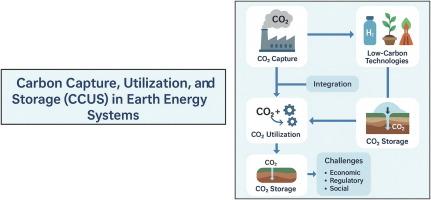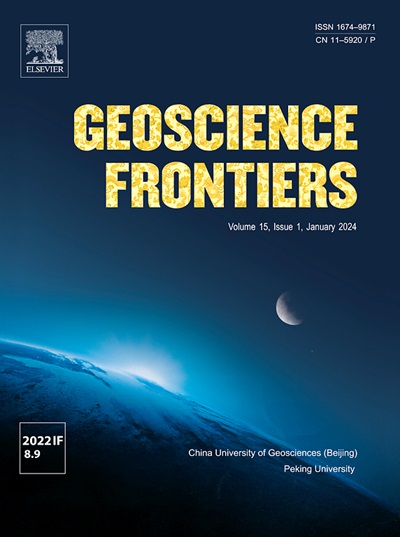Carbon capture, utilization, and storage (CCUS) in the context of earth energy systems: A multidisciplinary review
IF 8.9
1区 地球科学
Q1 GEOSCIENCES, MULTIDISCIPLINARY
引用次数: 0
Abstract
Carbon Capture, Utilization, and Storage (CCUS) has emerged as a critical technology for achieving global climate goals by enabling substantial reductions in carbon dioxide (CO2) emissions from industrial and energy systems. This multidisciplinary review provides a comprehensive assessment of CCUS technologies, their integration with earth energy systems, and their broader economic, environmental, and societal implications. It begins by detailing the fundamentals of CO2 capture, utilization, and geological storage, followed by an in-depth analysis of engineering infrastructure and geoscientific factors that underpin secure and efficient deployment. The review also examines how CCUS can be synergistically coupled with renewable and low-carbon technologies such as blue hydrogen, bioenergy, and geothermal systems to enhance sustainability and economic viability. In the policy and economic context, the study explores cost drivers, financing mechanisms, regulatory frameworks, market incentives, and deployment strategies, identifying both progress and persistent gaps. Furthermore, the environmental and societal impacts of CCUS are critically evaluated, with a focus on long-term storage risks, ecosystem concerns, and public acceptance challenges. A global overview of CCUS initiatives highlights regional progress, collaborative efforts, and the increasing momentum toward cluster-based infrastructure models. The article concludes by identifying key challenges—technical, regulatory, and social—and outlines future directions for innovation, policy harmonization, and global coordination. By synthesizing insights from geosciences, engineering, economics, and policy, this review underscores the pivotal role of CCUS as an enabling technology for a just and effective energy transition. It provides strategic guidance for researchers, policymakers, and industry stakeholders working to scale CCUS in alignment with net-zero targets and sustainable development goals (SDGs).

地球能源系统背景下的碳捕获、利用和封存(CCUS):多学科综述
碳捕集、利用与封存(CCUS)已成为实现全球气候目标的一项关键技术,它可以大幅减少工业和能源系统的二氧化碳排放。这篇多学科综述提供了CCUS技术的全面评估,它们与地球能源系统的整合,以及它们更广泛的经济、环境和社会影响。首先详细介绍了二氧化碳捕获、利用和地质储存的基本原理,然后深入分析了工程基础设施和地质科学因素,这些因素是安全有效部署的基础。该报告还探讨了CCUS如何与可再生能源和低碳技术(如蓝氢、生物能源和地热系统)协同结合,以提高可持续性和经济可行性。在政策和经济背景下,该研究探讨了成本驱动因素、融资机制、监管框架、市场激励和部署策略,确定了进展和持续的差距。此外,对CCUS的环境和社会影响进行了批判性评估,重点关注长期储存风险、生态系统问题和公众接受挑战。CCUS计划的全球概述强调了区域进步、协作努力以及基于集群的基础设施模式的增长势头。文章最后指出了技术、监管和社会方面的主要挑战,并概述了创新、政策协调和全球协调的未来方向。通过综合地球科学、工程学、经济学和政策方面的见解,本综述强调了CCUS作为公正有效的能源转型的使能技术的关键作用。它为研究人员、政策制定者和行业利益相关者提供了战略指导,以使CCUS与净零目标和可持续发展目标(SDGs)保持一致。
本文章由计算机程序翻译,如有差异,请以英文原文为准。
求助全文
约1分钟内获得全文
求助全文
来源期刊

Geoscience frontiers
Earth and Planetary Sciences-General Earth and Planetary Sciences
CiteScore
17.80
自引率
3.40%
发文量
147
审稿时长
35 days
期刊介绍:
Geoscience Frontiers (GSF) is the Journal of China University of Geosciences (Beijing) and Peking University. It publishes peer-reviewed research articles and reviews in interdisciplinary fields of Earth and Planetary Sciences. GSF covers various research areas including petrology and geochemistry, lithospheric architecture and mantle dynamics, global tectonics, economic geology and fuel exploration, geophysics, stratigraphy and paleontology, environmental and engineering geology, astrogeology, and the nexus of resources-energy-emissions-climate under Sustainable Development Goals. The journal aims to bridge innovative, provocative, and challenging concepts and models in these fields, providing insights on correlations and evolution.
 求助内容:
求助内容: 应助结果提醒方式:
应助结果提醒方式:


